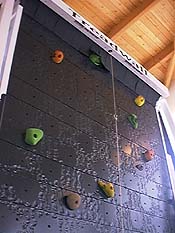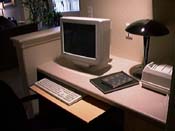Intercoms and free-weights have been replaced by rotating rubber rock-climbing walls and high-speed Internet connections in Valley apartments.
By Liz Garone
In the '80s, many of the Valley's apartment managers contented themselves and their tenants with a few extras: a pool, a spa, the basic weight room. Then there were those that offered the familiar adage of "everything under one roof" with numerous pools (at least one open 24 hours a day), tennis, basketball, volleyball, a fitness center, and, in some cases, a dry cleaner and the all-essential convenience store.
There really was no reason to ever leave the premises. Except, of course, to go to work.
Enter the late '90s. What was once dubbed "state-of-the-art fitness equipment" has been usurped by a new breed of luxury living. Indoor rock-climbing walls, virtual reality bikes and lightning-speed Internet connections are the latest lures to be dangled in front of Valley apartment seekers with lots of disposable income and a penchant for being the first on the block.
Even the need for commuting has gone the way of the Beta VCR, with in-house conference rooms available for use by the hour or the day and high-speed Internet connections in many of the individual apartments and/or in community areas. What were only recently considered extras and extravagant are quickly becoming standard in new apartment development.
Rents at these new complexes are higher than those for the average Valley apartments. Most start in the upper $700s for a one-bedroom. This compares to $500 to $600 at many of the older complexes. (Even $800 is a paltry fee by many urban area standards.) In the Valley, where one can still buy a house for less than $100,000 with only five percent down and the possibility of monthly payments under $1,000, these rents might appear out of line. No matter; the apartments are filling up almost as fast as they are being built, and the Valley occupancy rate remains steady at about 95 percent, according to James Rees of the Arizona Multi-Housing Association.
It isn't the lack of money that is stopping many high-end renters from buying homes, according to Jay Johnson, vice president of PangeaTech, a telecommunications provider, currently installing DirectTV and high-speed Internet connections in the Valley, Northern California, New Mexico and Nevada. "What's occurring in the apartment industry is a lot of renters by choice," says Johnson, "People are deciding: I don't know how long I'm going to be here; I know that I want these kind of amenities; and I know that I don't want to take care of a lawn."
PangeaTech has wired three Valley apartment complexes for Ethernet access to the Internet, and there is also DirectTV service now available in one of them. The apartments are in Phoenix, Chandler and Tempe, and are all managed by San Francisco-based SNK Development, which also owns PangeaTech. Rents start at $600-$700 for a one-bedroom. Tenants can pay a $35 monthly fee for unlimited Internet use, a personal e-mail address and a Web page. Installation runs anywhere from $45 to $99, depending on what computer hardware is needed.
Johnson estimates his Ethernet users' speeds at eight to ten times faster than traditional telephone connections. Slowdowns are inevitable, since everyone in the complex shares the same set of pipes, but there are never any busy signals, like in the case of AOL or many of the other ISPs.
Where Johnson and PangeaTech have chosen Ethernet, some other apartments have opted for cable Internet access.
At the Tradition at Kierland in northwest Scottsdale, rents start at $825 for a one-bedroom unit without a garage but with the requisite covered parking. There are also a limited number of high-end, $1,500-plus three-bedroom units with attached garages, gas fireplaces and golf-course views. Dataports and prewiring for six separate phone lines come standard in all units.
Even with their easy access to six phone lines, Tradition residents can get on the Internet without using the phone. Not through Ethernet, but with cable connections from Cox Communication. Advertisements for cox@home boast Net speeds of 300 times as fast as traditional telephone connections. (So far, this service is only available in select parts of the Valley, north Scottsdale being one of them.) Residents pay a $150 connection fee, then $44.95 a month for unlimited use. Cable connections are never busy but, like in the case of Ethernet, do fluctuate in speed.
While SNK and PangeaTech have focused almost exclusively on electronic amenities, Mark-Taylor Residential, which manages the Tradition and a number of other high-end apartment complexes, also uses high-tech recreation and relaxation to recruit potential renters. There are plenty of the latest gadgets and amenities in the Tradition's community areas. No waiting time at the rotating rubber rock-climbing wall, virtual reality bikes or the Nautilus inline skate machine in the 24-hour fitness center. Food and beverage servers will soon start taking orders on the weekends at the lagoon-style pool and sandy beach.
The Carlyle, located on Seventh Street north of Camelback, heavily advertises its fast Internet connection with dedicated T-1 lines in all apartments (again, no need for an extra phone line). There is a $40 monthly fee for unlimited access and a $100 charge for the installation. What sets the Carlyle apart is its " built-in tech centers," consisting of a small office space within the living room designed for a computer, modem and printer. The tech center is standard in all units. Rents at the Carlyle start at $799 for a one-bedroom.
What next? Espresso bars? Too late. Pinnacle Towne Center in midtown Phoenix (on Highland right off the Squaw Peak Parkway) already has one, along with a DVD-equipped movie theater and a 24-hour business center with free faxes, color scans, printouts and Internet access. One bedroom townhouses start at $875.
Anyone for a latte?


The Tradition's rotating climbing wall

Virtual bike riding anyone?

The Carlyle's built-in tech center
